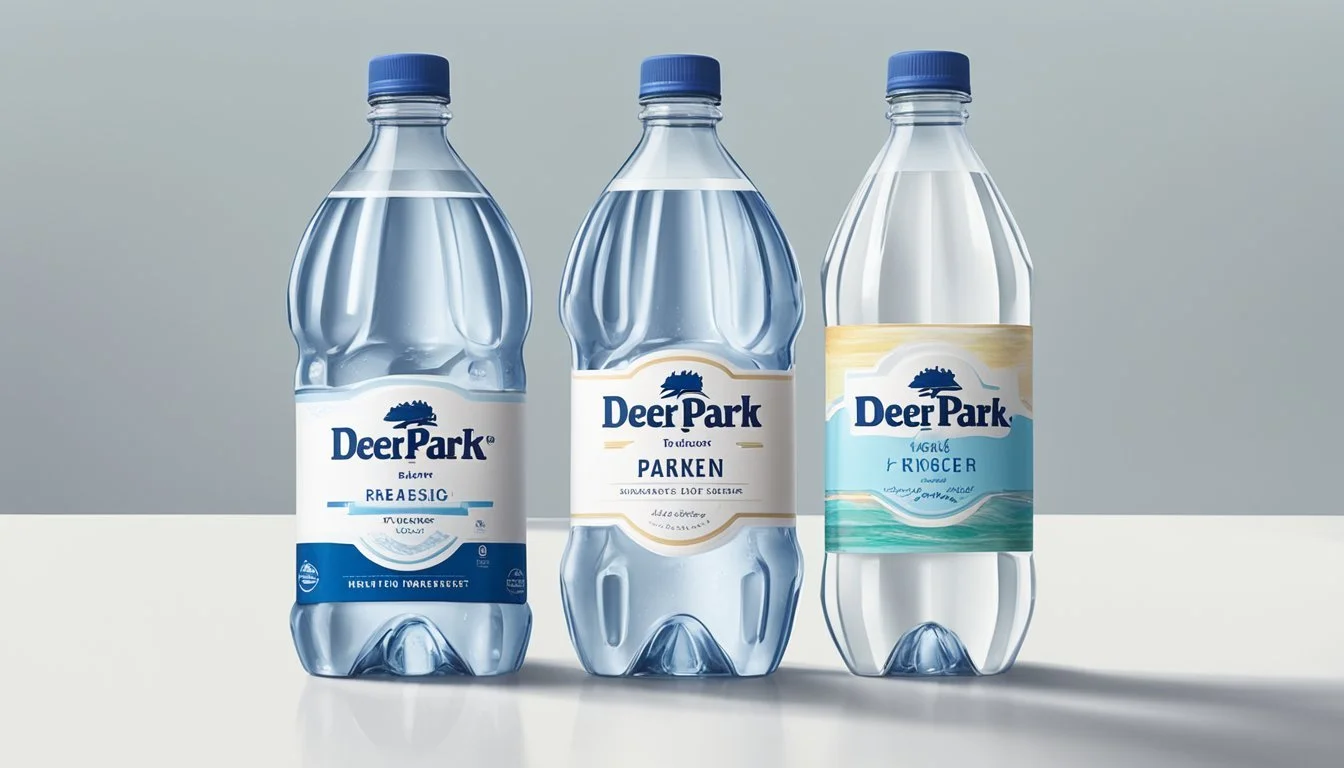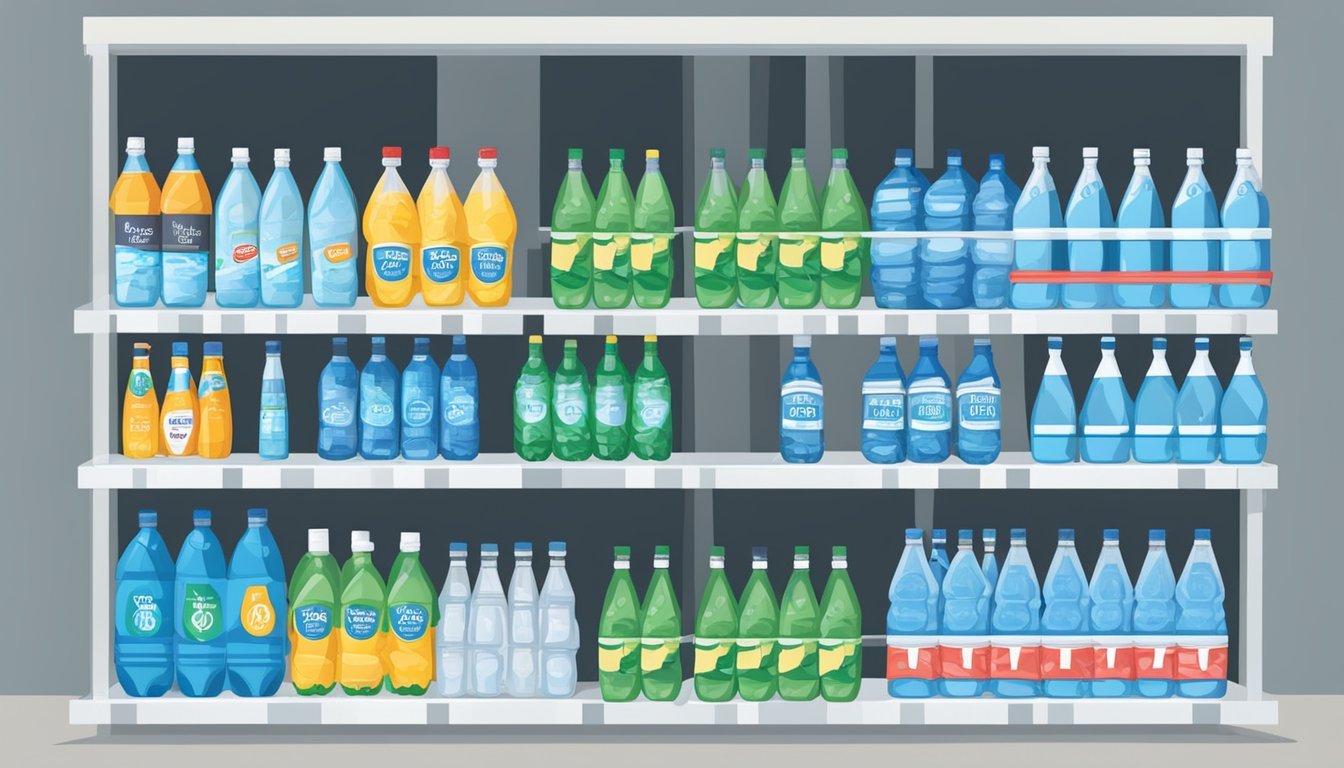Deer Park vs. Kroger
Comparing Bottled Water Quality
When it comes to choosing bottled water, the debate often narrows down to popular brands like Deer Park and Kroger. Both brands claim to offer pure, refreshing water, but which one truly stands out? Deer Park, known for its 100% natural spring water sourced from the Eastern Seaboard, prides itself on delivering a crisp and clean taste.
On the other hand, Kroger, a well-known supermarket brand, offers its own line of bottled water, typically marketed for value and convenience. While Kroger’s water may be more budget-friendly, some argue it lacks the distinctive taste that brands like Deer Park offer. Comparing the two involves looking not only at taste and purity but also at factors like source, packaging, and price.
Understanding the nuances between these brands can help consumers make an informed choice about their hydration needs. Whether it’s the natural spring source of Deer Park or the widespread availability of Kroger, each has its own set of advantages that appeal to different preferences.
Historical Background of Deer Park and Kroger Brands
Deer Park is an American brand of bottled water, renowned for its natural spring origin. The brand's history can be traced back to the post-Civil War era. Following the war, the Baltimore and Ohio Railroad (B&O) discovered a spring in the Appalachian region. In 1873, the Deer Park Hotel began offering spring water as a luxury amenity.
Over time, Deer Park became known for its high-quality, 100% natural spring water sourced from various springs along the Eastern Seaboard. Today, Deer Park is a part of BlueTriton Brands.
Kroger, meanwhile, is one of the largest supermarket chains in the United States. Founded in 1883 by Bernard Kroger in Cincinnati, Ohio, Kroger has expanded to offer a vast selection of products, including its own private-label bottled water. As part of Kroger's commitment to providing value and quality to its consumers, the company introduced its bottled water to offer an affordable and reliable hydration option.
Kroger’s bottled water is typically sourced from municipal supplies, then purified through advanced filtration processes. This approach ensures accessibility and affordability, in line with Kroger’s broader food retailing business strategy.
Comparison Table: Historical Highlights
Brand Founded Origin Location Water Source Parent Company Deer Park Post-Civil War Appalachian Springs, MD Natural Springs BlueTriton Brands Kroger 1883 Cincinnati, OH Municipal Supply Kroger
Both Deer Park and Kroger have carved out distinctive niches in the bottled water market through their historical development and commitment to quality. Deer Park focuses on natural spring sources, while Kroger emphasizes accessibility and value through purified municipal water.
Water Sources and Processing
Understanding the origins and treatment of bottled water products is crucial. Let's examine Deer Park and Kroger, focusing on where they source their water and the processes they use to ensure quality and safety.
Deer Park Natural Spring Water
Deer Park sources its water from several natural springs located in the Appalachian Mountains. The water is collected from deep aquifers and is known for its crisp, clean taste.
The source of Deer Park water is carefully selected for its purity. Rigorous quality control measures are in place to maintain the natural taste. Filtration includes sediment removal and UV light treatment to eliminate contaminants without adding chemicals. No additional minerals are added.
Kroger Brand Water
Kroger's bottled water is generally sourced from municipal supplies, meaning it begins as tap water. This water undergoes extensive processing to ensure it meets safety standards.
The system used includes reverse osmosis, carbon filtration, and ozone treatment. Reverse osmosis removes impurities, while carbon filtration further purifies the water. Ozone treatment is the final step, ensuring the water is free from harmful microorganisms. This process results in clean, safe drinking water with consistent taste.
Comparing Sourcing and Filtration Methods
Feature Deer Park Natural Spring Water Kroger Brand Water Source Natural springs in Appalachians Municipal supplies Initial Filtration Sediment removal Reverse osmosis Purification UV light treatment Carbon filtration, ozone treatment Mineral Content Natural minerals retained Generally mineral-free
Deer Park and Kroger use different methods to source and treat their water. Deer Park relies on natural spring sources, using minimal treatment to preserve its natural content. Meanwhile, Kroger employs advanced filtration techniques on municipal water to ensure purity.
Both methods produce safe and quality drinking water, but they cater to different preferences. Deer Park offers a natural taste, while Kroger provides a more standardized product through rigorous processing.
Health Benefits and Considerations
When comparing Deer Park and Kroger bottled waters, it is crucial to evaluate their hydration properties, mineral content, pH levels, purity, and potential additives. These elements significantly impact overall health and water quality.
Hydration and Mineral Content
Both Deer Park and Kroger bottled waters provide adequate hydration. Deer Park water is sourced from various natural springs along the Eastern Seaboard and contains naturally occurring minerals. These minerals can include calcium, magnesium, and potassium, which are beneficial for maintaining bodily functions.
Kroger bottled water, adhering to FDA standards, ensures it meets safety and quality benchmarks. While Kroger water also hydrates effectively, it may have fewer naturally occurring minerals compared to spring water sources. Some people prefer mineral water for its potential health benefits like supporting bone health and metabolic processes.
Comparison of Mineral Content (per liter):
Mineral Deer Park Kroger Calcium 20 mg Varies Magnesium 10 mg Varies Potassium 5 mg Varies
pH Levels and Quality
The pH level of water is a vital indicator of its quality. Deer Park typically boasts a neutral to slightly acidic pH, ranging from 6.3 to 8.7. This range keeps it close to the natural pH of pure water, ensuring it tastes good and maintains its health benefits.
Kroger bottled water, like many purified bottled waters, aims for a neutral pH around 7. This neutrality is achieved through various filtration processes, ensuring the water is free from most impurities. Balanced pH levels are essential as they influence water taste and body functions ensuring the water is neither too acidic nor too alkaline for consumption.
Comparison of pH Levels:
Brand pH Range Deer Park 6.3-8.7 Kroger ~7
Assessing Purity and Additives
Deer Park prides itself on its natural spring sources, which usually means lower levels of impurities like PFAS, lead, and microplastics. However, the natural sourcing can sometimes lead to slight variations in purity due to environmental factors.
Kroger bottled water undergoes rigorous filtering processes to eliminate contaminants. Made to adhere to FDA regulations, it ensures low or no levels of harmful substances such as microplastics and BPA. Kroger has also responded to concerns about contaminants, moving towards BPA-free bottles to enhance consumer safety.
Considerations for Purity:
Microplastics: Both brands aim to minimize.
Lead: Typically undetectable in FDA-compliant bottled waters.
Fluoride: May be added or naturally occurring in trace amounts.
Maintaining purity and scrutinizing potential additives are crucial for health, impacting the consumer’s confidence in the water's safety.
Health and Safety Standards
When comparing Deer Park and Kroger bottled water, their health and safety standards are crucial. Various organizations such as the FDA and EPA set guidelines to ensure the safety of bottled water, which includes monitoring for contaminants like PFAS chemicals, heavy metals, and other toxins.
FDA Regulations on Bottled Water
The FDA regulates bottled water as a food product under the Federal Food, Drug, and Cosmetic Act.
This means that bottled water must comply with standards for quality and labeling.
Deer Park and Kroger bottled water must meet these strict requirements, which ensure that they are free from harmful levels of contaminants like arsenic, lead, and mercury.
The FDA's standards include testing for microbiological purity, which ensures that bottled water does not contain harmful bacteria or viruses.
Both Deer Park and Kroger are required to follow Good Manufacturing Practices (GMP) to maintain cleanliness and safety during production and bottling.
EPA Guidelines Versus Bottled Water
The EPA sets guidelines for drinking water quality under the Safe Drinking Water Act.
While these are mainly aimed at public water systems, they provide a benchmark for bottled water quality.
Deer Park, sourced from natural springs, and Kroger, typically municipal sources, must ensure contaminants are within safe levels.
EPA guidelines cover a broad range of potential contaminants, including toxic chemicals, heavy metals, and PFAS.
These substances must be monitored closely.
Bottled water companies often voluntarily follow these standards to provide reassurance to consumers about their product’s safety.
Evaluating Contaminants and Safe Drinking Levels
Quality reports for bottled water commonly test for a wide array of contaminants. These include heavy metals like lead and mercury, as well as organic chemicals such as PFAS.
Deer Park has been found to contain PFAS levels well within FDA guidelines, ensuring safety.
Kroger water adheres to FDA standards and is often tested to confirm it meets safety regulations.
Concerns about contaminants like BPA and microplastics in bottled water are ongoing.
While many brands, including Kroger, have switched to BPA-free bottles, the presence of microplastics remains an area for further research.
Regular testing and transparent reporting are key factors in maintaining consumer trust.
Taste Profile Comparison
Deer Park and Kroger bottled waters exhibit unique taste profiles shaped by their mineral content and sourcing. Consumer taste tests reveal distinct preferences based on these taste attributes.
Consumer Taste Test Results
Deer Park:
Taste: Known for its crisp and clean flavor, attributed to its natural spring water source.
Mineral Content: Varies depending on the specific spring, offering a naturally balanced taste.
Electrolytes: Contains natural electrolytes, enhancing its refreshing quality.
Kroger:
Taste: Features a consistent and neutral taste, often praised for its smoothness.
Mineral Content: Typically fortified with added minerals, which aim to provide a balanced taste profile.
Electrolytes: May include added electrolytes, contributing to the neutral and refreshing flavor.
Consumer Preferences:
In taste tests, some consumers favor Deer Park for its natural and varying mineral content. Others prefer Kroger for its consistency and neutral taste. Both brands have their distinct appeal, largely dependent on individual taste preferences.
Environmental Impact and Sustainability
The environmental impact and sustainability of bottled water involve considerations of both the materials used in bottle production and conservation of water sources. Each brand has varying practices that affect their overall environmental footprint.
Bottle Production and Materials
The production of plastic bottles for water brands like Deer Park and Kroger significantly impacts the environment. Deer Park, for instance, primarily uses single-use plastic bottles, contributing to pollution and waste. Similarly, Kroger bottled water faces scrutiny for its plastic usage despite adhering to regulatory standards.
Many brands, including Flow and Just Water, utilize eco-friendlier packaging options like cartons or recycled plastics. International Bottled Water Association emphasizes using more sustainable materials to reduce carbon footprints. Switching from petroleum-based plastics to biodegradable or recyclable materials remains a crucial step for sustainability. Products such as Icelandic Glacial and Smartwater often market their packaging innovations, making them popular among eco-conscious consumers.
Water Source Conservation
Conserving water sources is vital in the sustainability conversation. Deer Park sources its water from natural springs across the Eastern Seaboard, which must be managed responsibly to avoid over-extraction and maintain ecological balance. In contrast, Kroger typically sources its water from municipal supplies, though the actual details vary by region.
Brands like Pure Life and Voss highlight responsible water management and the maintenance of local ecosystems in their marketing. Acqua Panna and Lifewtr emphasize sourcing from protected springs, ensuring minimal environmental disruption. Effective water source management by companies is critical to ensure long-term availability and to protect local habitats and communities.
By addressing both material use and water source conservation, brands can significantly reduce their environmental impact and improve sustainability practices.
Price Comparison and Value Assessment
When comparing the prices of Deer Park and Kroger bottled water, it's essential to consider the price per bottle and the value offered by each brand.
Deer Park
Deer Park offers a range of sizes, with typical pricing as follows:
16.9 oz (500 ml): Around $0.15 per bottle when bought in bulk.
1-gallon jug: Approximately $1.00 per jug.
Deer Park prides itself on its natural spring water, sourced primarily from springs in the United States. The brand is known for its clean taste and affordability.
Kroger
Kroger's bottled water options include:
16.9 oz (500 ml): Around $0.10 per bottle when bought in bulk.
1-gallon jug: Approximately $0.80 per jug.
As a private-label brand of a major grocery chain, Kroger offers competitive pricing aimed at cost-conscious consumers. Their bottled water is typically purified, providing a reliable yet economical choice.
Comparison Table
Brand Bottle Size Price (approx.) Type Deer Park 16.9 oz $0.15 Spring Water Deer Park 1 gallon $1.00 Spring Water Kroger 16.9 oz $0.10 Purified Water Kroger 1 gallon $0.80 Purified Water
Value Assessment
Deer Park: Offers natural spring water at a slightly higher price, catering to those who prefer premium sources.
Kroger: Provides purified water at a lower price, appealing to budget-focused consumers.
Other premium brands like Core Hydration, Essentia, Ethos Water, and sparkling options like La Croix, Perrier, and San Pellegrino are more expensive. Boxed Water is also a pricier, eco-friendly alternative.
Choosing between Deer Park and Kroger will depend on whether consumers value spring water's natural source or prefer purified water at a lower cost.
Brand Reputation and Consumer Perception
Deer Park and Kroger are both long-standing brands in the bottled water market. Understanding the public's perception and how these brands are discussed online can provide insight into their respective reputations.
Social Media and Online Reviews
On platforms like Twitter, social perception plays a significant role in shaping brand reputation. Deer Park's positioning as 100% natural spring water sourced from multiple springs across the eastern United States often garners positive feedback. Consumers frequently highlight its clean and crisp taste, contributing to a favorable online presence.
Kroger, associated with affordability and accessibility, receives mixed reviews. While appreciated for its competitive pricing, some consumers point out variability in taste and quality. As a widespread grocery brand, Kroger's bottled water benefits from broad availability, making it a convenient option for many, yet this same aspect can lead to less uniform product experiences.
Deer Park and Kroger in the Public Eye
Deer Park benefits from a reputation that aligns with its parent company, Nestlé, known for rigorous quality control. This acknowledgment of quality helps solidify Deer Park's standing in the public eye. The brand's emphasis on sourcing from natural springs appeals to those prioritizing purity and natural origins, enhancing trust among consumers.
Kroger, while not as specialized as Deer Park, is seen as a practical choice among bottled water brands. The association with the Kroger grocery chain means that consumers often view it through the lens of everyday reliability. Although not marketed with the same emphasis on natural spring sourcing, Kroger's reputation for affordability makes it a staple purchase for price-conscious customers.
Conclusion: Which Bottled Water Wins?
When comparing Deer Park and Kroger bottled water, several key aspects stand out.
Taste plays a significant role in preference. Deer Park, being a 100% natural spring water, is noted for its crisp and clean flavor, sourced from multiple springs across the Eastern Seaboard.
Hydration efficiency depends on the water's composition. Deer Park's pH ranges from 6.3 to 8.7, while Kroger’s bottled water generally has a neutral pH close to 7. Users often find Deer Park’s hydration slightly favorable due to its natural mineral content.
Mineral Water versus Still Water is another point to consider. Deer Park offers a more natural mineral profile, being spring water. Kroger’s water, often processed, may lack these natural minerals, which some consumers prefer for taste and potential health benefits.
Bottom Line: For those who prioritize 100% natural spring water with a more refreshing taste and natural mineral content, Deer Park might be the better choice. Kroger, meanwhile, offers a more consistent and possibly more affordable option, suitable for consumers who are less concerned about the source and mineral content.
In making a choice between the two, it ultimately comes down to personal preferences regarding taste, hydration needs, and the desire for natural minerals in the water. Both brands provide quality still water options but cater to different consumer expectations and priorities.
More About Deer Park
Deer Park vs Cascade Mountain: Which Bottled Water is Better?
Deer Park vs Hawaii Volcanic: Which Bottled Water is Better?
Deer Park vs Hawaiian Springs: Which Bottled Water is Better?
Deer Park vs Icelandic Glacial: Which Bottled Water is Better?
Deer Park vs Kirkland Signature: Which Bottled Water is Better?
Deer Park vs Mountain Valley Spring Water: Which Bottled Water is Better?
Deer Park vs Nestle Pure Life: Which Bottled Water is Better?
Deer Park vs Richard's Rainwater: Which Bottled Water is Better?
Deer Park vs Solan de Cabras: Which Bottled Water is Better?
Deer Park vs Talking Rain AQA: Which Bottled Water is Better?
Deer Park vs Whole Foods 365: Which Bottled Water is Better?
Deer Park vs Whole Foods Italian Still Mineral water: Which Bottled Water is Better?






